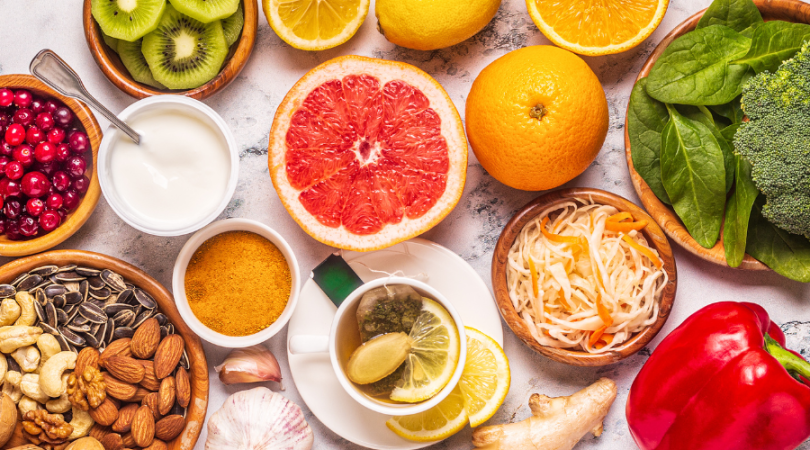Introduction
In today’s fast-paced world, maintaining a robust immune system is more important than ever. As we face various environmental stressors, pathogens, and lifestyle challenges, our bodies’ ability to defend against illness is crucial. The immune system acts as our body’s defense mechanism against infections and diseases, and a well-balanced diet plays a vital role in its functionality. Certain foods, often referred to as “superfoods,” are packed with nutrients that can enhance immune function. This article will explore ten superfoods that can help boost your immune system and promote overall health.
1. Citrus Fruits
Citrus fruits, including oranges, lemons, grapefruits, and limes, are rich in vitamin C, a powerful antioxidant known for its immune-boosting properties. Vitamin C helps stimulate the production of white blood cells, which are essential for fighting infections. According to the National Institutes of Health (NIH), adults should aim for 65 to 90 milligrams of vitamin C per day.
Health Benefits: Vitamin C plays a critical role in various bodily functions, including the maintenance of skin, blood vessels, and cartilage. It also helps in wound healing and enhances the absorption of iron from plant-based foods.
Recipe Idea: Start your day with a refreshing citrus smoothie. Blend together orange juice, a banana, and a handful of spinach for a nutrient-packed breakfast.
2. Garlic
Garlic is not only a flavorful addition to many dishes but also a potent immune booster. It contains compounds like allicin, which have been shown to enhance the immune response. A study published in the Journal of Nutrition found that garlic supplementation reduced the severity of colds and flu in participants.
Health Benefits: Garlic has anti-inflammatory and antioxidant properties, making it beneficial for heart health as well.
Recipe Idea: Incorporate fresh garlic into your cooking by adding it to roasted vegetables or pasta dishes. You can also make garlic-infused olive oil for drizzling on salads.
3. Ginger
Ginger has long been used in traditional medicine for its anti-inflammatory and antioxidant effects. It can help reduce inflammation in the body and may enhance immune function. Research published in the journal Frontiers in Immunology suggests that ginger may help modulate immune responses and protect against respiratory infections.
Health Benefits: Ginger is also known for its digestive benefits and can help alleviate nausea and motion sickness.
Recipe Idea: Brew a soothing ginger tea by steeping fresh ginger slices in hot water. Add honey and lemon for added flavor and benefits.
4. Spinach
Spinach is a nutrient-dense leafy green that is high in vitamins C and E, beta carotene, and antioxidants. These nutrients work together to strengthen the immune system and protect against oxidative stress. A study published in Nature found that individuals who consumed more fruits and vegetables, including spinach, had a lower risk of developing chronic diseases.
Health Benefits: Spinach is also rich in iron, which is crucial for oxygen transport in the blood and energy production.
Recipe Idea: Add fresh spinach to salads, smoothies, or omelets. You can also sauté spinach with garlic for a delicious side dish.
5. Yogurt
Yogurt is a great source of probiotics, which are beneficial bacteria that support gut health. A healthy gut microbiome is essential for a robust immune system. Research indicates that probiotics can enhance the immune response and reduce the risk of respiratory infections. Look for yogurts that contain live and active cultures for the best benefits.
Health Benefits: Yogurt is also a good source of calcium and protein, contributing to bone health and muscle maintenance.
Recipe Idea: Enjoy yogurt as a snack or breakfast by adding fresh fruits, nuts, and a drizzle of honey for sweetness.
6. Almonds
Almonds are packed with vitamin E, a fat-soluble antioxidant that plays a vital role in immune function. A study published in the American Journal of Clinical Nutrition found that vitamin E supplementation improved immune response in older adults. Just a handful of almonds (about 1 ounce) provides nearly 7.3 milligrams of vitamin E, which is about half of the recommended daily intake for adults.
Health Benefits: Almonds also provide healthy fats, fiber, and magnesium, which are important for heart health and overall wellness.
Recipe Idea: Snack on raw or roasted almonds or add them to salads and oatmeal for added crunch and nutrition.
7. Turmeric
Turmeric is a bright yellow spice known for its anti-inflammatory properties, primarily due to its active compound, curcumin. Curcumin has been shown to enhance immune function and reduce inflammation in the body. Research published in the journal Advances in Nutrition suggests that curcumin may help modulate immune responses and protect against chronic diseases.
Health Benefits: Turmeric is also linked to improved brain function and reduced risk of heart disease.
Recipe Idea: Add turmeric to soups, stews, or smoothies, or enjoy it as a warm turmeric latte made with almond milk and honey.
8. Green Tea
Green tea is rich in antioxidants, particularly catechins, which have been shown to enhance immune function. A study published in the journal Molecular Nutrition & Food Research found that green tea consumption was associated with a reduced risk of infections and improved immune responses. Additionally, the amino acid L-theanine found in green tea may help in the production of germ-fighting compounds in T-cells.
Health Benefits: Green tea is also known for its metabolism-boosting properties and may aid in weight management.
Recipe Idea: Brew a cup of green tea and enjoy it plain or with a splash of lemon for added flavor.
9. Blueberries
Blueberries are not only delicious but also packed with antioxidants, particularly flavonoids, which have been shown to enhance immune function. A study published in the Journal of Nutritional Biochemistry found that the consumption of blueberries improved immune responses in older adults. Additionally, their high vitamin C content further supports immune health.
Health Benefits: Blueberries are also anti-inflammatory and may help reduce the risk of heart disease.
Recipe Idea: Add blueberries to your breakfast cereal, yogurt, or smoothies for a nutrient-rich treat.
10. Sweet Potatoes
Sweet potatoes are an excellent source of beta-carotene, which the body converts into vitamin A. Vitamin A is essential for maintaining the integrity of mucosal surfaces, such as those in the respiratory tract, which play a critical role in immune defense. A study published in the Journal of Nutrition found that adequate vitamin A intake is associated with improved immune function.
Health Benefits: Sweet potatoes are also high in fiber, which supports digestive health.
Recipe Idea: Bake or roast sweet potatoes as a nutritious side dish or mash them for a comforting meal.
Conclusion
Incorporating these ten superfoods into your diet can help strengthen your immune system and promote overall health. A balanced diet rich in fruits, vegetables, whole grains, and healthy fats is essential for optimal immune function. Remember that no single food can prevent illness; rather, it’s the combination of healthy foods and lifestyle choices that contribute to a robust immune system.
As you strive to boost your immune health, consider combining these superfoods into your meals and snacks. Whether it’s a refreshing smoothie loaded with spinach and ginger or a yogurt parfait topped with blueberries and almonds, the possibilities are endless. Embrace these nutrient-dense foods and take proactive steps toward better health and immunity.
Additional Tips for a Healthy Immune System
Stay Hydrated: Drinking plenty of water is crucial for maintaining overall health and supporting immune function.
Get Regular Exercise: Physical activity can help improve circulation and promote a healthy immune response.
Manage Stress: Chronic stress can weaken the immune system, so consider incorporating relaxation techniques such as meditation or yoga into your routine.
Prioritize Sleep: Aim for 7-9 hours of quality sleep each night to support immune health and overall well-being.
By making these lifestyle changes and incorporating these superfoods into your diet, you can help ensure that your immune system remains strong and resilient.







